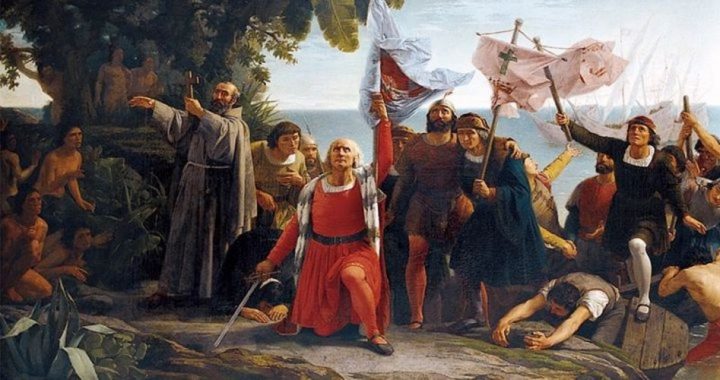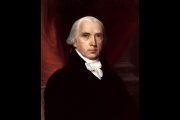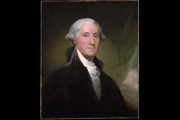
As the nation celebrates the federal Columbus Day holiday on October 10 (the traditional observance was for many years on October 12, the anniversary of Christopher Columbus’ arrival in the Americas on October 12, 1492) a small but persistent movement to replace the holiday with alternative holidays such as “Indigenous People’s Day” continues to pop up across America.
The latest notable example of this trend to eliminate the Columbus Day holiday was on October 6, when Vermont Governor Peter Schumlin signed an executive proclamation marking the second Monday of October as Indigenous People’s Day. According to the proclamation, the purpose of the proclamation is to recognize that the state “was founded and is built upon lands first inhabited by the Indigenous Peoples of this region,” WPTZ, the NBC TV affiliate in Plattsburgh, New York–Burlington Vermont region reported.
The movement against the holiday honoring the venerable explorer (the poetic version of whose name — Columbia — personifies the United States and gave rise to name of the District of Columbia) first gained traction in areas with strong leftist political leanings (such as Berkeley, California) or with large Native American Indian populations (such as South Dakota). Both areas replaced Columbus Day with Indigenous People’s Day in the 1990s.
Vermont, which has sent self-described socialist Bernie Sanders to the Senate since 2007, is fertile political ground for a movement that seeks to erase a holiday that has long been celebrated in United States. In 1792, New York City and several other U.S. cities celebrated the 300th anniversary of Columbus’ landing in the New World. A century later, President Benjamin Harrison called upon the people of the United States to celebrate Columbus Day on the 400th anniversary of the event. During that nationwide celebration in 1892, teachers, preachers, poets, and politicians used Columbus Day events as backdrops to teach ideals of patriotism. The 1843 song, “Columbia, the Gem of the Ocean,” which once functioned as an unofficial national anthem, was popular at these events.
Columbus Day was first proclaimed a state holiday by Colorado governor Jesse F. McDonald in 1905. It is ironic, therefore, that this week, the Denver City Council, which observed Indigenous People’s Day last year under a temporary proclamation, made the holiday permanent after a unanimous vote on October 4.
Columbus Day was named a federal holiday in 1934, as a result of lobbying by the Catholic fraternal organization The Knights of Columbus and New York City business entrepreneur Generoso Pope, an Italian immigrant. Congress authorized the proclamation, which was signed by President Franklin D. Roosevelt. Presidents, right up to Barack Obama, have continued to issue such proclamations ever since. One would think that the endorsement of such a long line of Democratic presidents (along with the Republicans who served in between) would be enough to satisfy the historical revisionists and cultural iconoclasts who believe that no cultural icon treasured by Americans is too sacred to be immune from eradication. But that is evidently not the case.
An article about the movement to abolish Columbus Day in the Washington Post comments on two voices for and against the holiday:
Although Native American groups consider Columbus a European colonizer responsible for the genocide of millions of indigenous people, supporters of the holiday have argued that he was an important figure in Italian American heritage. A day in his honor celebrates “the beginning of cultural exchange between America and Europe,” according to the Order of Sons of Italy in America.
The explanation is an oversimplification, at best. While no one can dispute that the Native American Indians were at times and in places treated abominably by the Europeans who settled America, the figure cited (“millions”) can hardly be substantiated. Furthermore, the term “genocide” suggests a conscious intent to eliminate a people. An article published by the Order of Sons of Italy in America back in 2005 refuted the charge that Columbus was responsible for genocide, noting in part:
The destruction of the native populations of North and South America over the centuries is a complex historical tragedy. No one knows exactly how many people were here when the Europeans arrived….
Columbus made four voyages to the Caribbean in a twelve-year period (1492-1504), spending from only seven months to two years and nine months (including the year he was shipwrecked on his fourth voyage.) It is inconceivable that he could have killed millions of people in so short a time….
Responsibility for the deaths of many thousands of natives can justly be attributed to the Spanish conquistadors and other Europeans who followed Columbus here. But even in this case, since there were more natives than Europeans, the loss of millions of lives could not have been caused by the Spaniards’ warfare and forced labor alone.
In fact, most of the native populations perished because they lacked immunity to such diseases as small pox, typhoid and diphtheria as well as the non-fatal childhood diseases of measles and mumps that they caught from the Spanish explorers. These diseases were not transmitted deliberately and cannot be considered a tool of genocide.
While this particular defense of Columbus was compiled by an Italian-American philanthropic and cultural society, and Italian Americans are proud of the fact that Columbus (who was born in Genoa, Italy, where two of this writer’s great grandparents were also born) played such a significant part in the European exploration of the Americas, Americans of all ancestries have long had a high regard for Columbus. As we have seen, the name “Columbia” was widely used as a personification of the United States from our nation’s earliest days, and Columbus Day was first celebrated in New York on October 12, 1792.
However, the assault on Columbus Day has been going on for decades. Those who understand the anti-American sentiment that has long prevailed at the United Nations will not be surprised to learn that back in 1977, the International Conference on Discrimination Against Indigenous Populations in the Americas, sponsored by the UN in Geneva, began to discuss replacing Columbus Day in the United States with a celebration to be known as Indigenous Peoples Day.
In an article posted by The New American last year, “Attacking America: Columbus Day Being Replaced With ‘Indigenous Peoples Day,’” Selwyn Duke noted:
While the inroads made by the anti-Columbus Day movement are news, the mentality driving it is nothing new. It’s the same thinking that decades ago already led to the chant “Hey, hey, ho, ho, Western Civ has got to go” and has long instigated the steady denuding of our Western cultural landscape. And while it has a foundation in an emotion-based antipathy for the West, it also reflects moral confusion and intellectual bankruptcy.
Duke went on to observe that “one complaint against Columbus Day and so, so many other things, is that they reflect a Western perspective.” To which he countered: “The truth is that we’re supposed to have a Western perspective because we’re a Western civilization — and that we should thank God, and some dead white males, that we are.”
This writer was fortunate to have first studied American history from the perspective that our American civilization is an extension of “Western Christian civilization,” brought to America from Europe by our colonial and immigrant forefathers. The transplant of that civilization was made possible by explorers such as Columbus, and Cabot, and Hudson, and Verrazzano and missionaries such as Father Junipero Serra. This historic fact greatly bothers the enemies of Western Christian (sometimes called Judeo-Christian) Civilization because they intend to destroy that civilization and the historical memory of all who were responsible for bringing it to America.
Related articles:
Attacking America: Columbus Day Being Replaced With “Indigenous Peoples Day”
Warren Mass is a Fourth Degree Knight of Columbus



